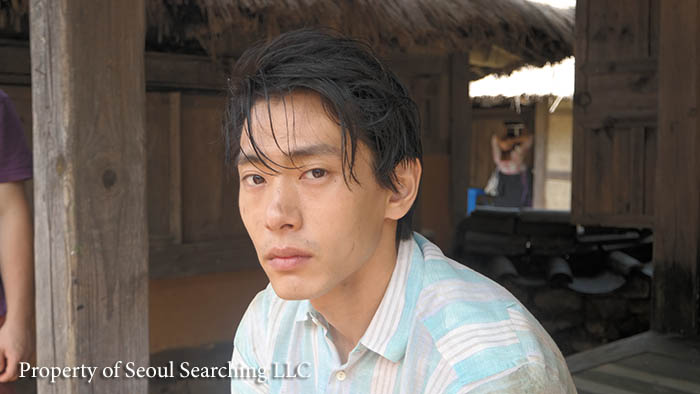by JAMES S. KIM | @james_s_kim
editor@charactermedia.com
Korean German Teo Yoo is a classically trained actor. He studied acting in New York and the United Kingdom and performed in theater productions back home in Germany, while traveling to and from NYC. In 2009, Yoo moved to South Korea to pursue work, but it was a struggle to adapt to Korean society.
“Just being sociable in Korea is just very tough for me,” the Cologne native told KoreAm back in January. “It required me to get rid of a lot of etiquette that I learned and adopt new ones, so there was a time when I struggled with my identity.”
The struggles and insecurity also affected his acting, and that led to a disappointing audition process for Seoul Searching. Director Benson Lee found his audition tape to be less than satisfactory, despite that the character Yoo was auditioning for, Klaus Kim, was also a Korean German. But Yoo knew that Lee wasn’t just going to hand the role to him.
“He’s been struggling in Korea because he has to play Korean roles, and it’s been hard for him,” Lee said. “But he’s such a talented actor. [In Seoul Searching], he finally got to play a role where he plays himself, which he completely shined in.”
Yoo finally landed the role after he met Lee in person to deliver a live audition, and through rehearsals and filming, Yoo found his identity again as an actor and person.
“It was very comfortable,” Yoo said of the experience. “I trusted [Benson’s] direction, he trusted my character rendition. It was easy.”
Yoo spoke to KoreAm about playing Klaus, who is based on Lee’s actual Korean German roommate from the 1986 summer camp. This interview has been edited for length, grammar and clarity.
KoreAm: What did you think of the character when you first read about Klaus?
Teo Yoo: I thought he was a good archetype. I think that was my first reaction. I was like, “Oh, that’s a good character.”
I think the writing was really good in general. I’m always looking for a good narrative, not just for the plot but also for my character. So, when the audience goes through the story, I want them to see the differences [in my acting], even if it’s subtle, such as the physicality in the way Klaus would behave and carry himself.
I was looking for allowances for those kinds of cues. That drew me to it. I was really excited that there was a good piece of writing for Asians.
 Yoo, left, with Rosalina Leigh.
Yoo, left, with Rosalina Leigh.
What were some of Klaus’ themes that stood out to you?
To boil it down, one was the ongoing relationship with a girl he’s attracted to, because he has a girlfriend back home. He has to allow himself to change.
The other was realizing what it means for gyopos and their relationships with their parents. A lot of gyopos take their situation for granted. They kind of understand—intelligently understand—the struggles their parents went through, but they don’t get it wholeheartedly. I feel like Klaus gets in touch with that experience through his interactions with Kris.
 Yoo, center, with fellow cast and crew on set.
Yoo, center, with fellow cast and crew on set.
How did you interact with your fellow castmates?
We went out partying a few times. We rehearsed for two weeks beforehand. Just growing together—because we were all kind of in this unique situation—it was all very exciting. We bonded very quickly, all of us. It was such a unique summer, and I feel like the film’s story symbolically reflected what we all went through during that summer. At least for me.
It was also an independent production. The budget was tight, and it showed on the set. During production, people were stressed, but everyone came together and made a very good film.
How was it acting with other individuals who come from diverse backgrounds?
It came easily because during pre-production we had a lot of time to rehearse. Benson really wanted to go through the rehearsals because he knew production would take a lot of work. The chemistry kind of shows on screen. I believe it was easy because we all became friends with each other first and supported one another. Knowing that Esteban Ahn (plays Sergio Kim) was a first-time actor, we talked confidence into him. He’s so funny.
Were there any themes in the movie that you connected with?
I’ve got to say, all of them. All of the characters have their unique struggles. They are kind of symbolic for situations that I have been through in my life—not to that extreme extent, but certain situations that gyopos can relate to, especially [those concerning] father issues, simply because of the generational changes and the diversity of the next generation.
I could relate to every one. There wasn’t really a unique or situation that popped out to me.
How was it working with Cha In-Pyo? What was the impact of having him as part of production?
Just seeing his face in the trailer, it was amazing that he came on board. He made an effort to be the hyung to all of us. He was really nice, and he invited us for lunch at some private club in Seoul.
I think after someone asked him, I caught him answering why he was attracted to the project. He said, when he studied in the U.S., he felt like bool-sang-hae, or compassion, for gyopos. I feel like he’s interested in projects dealing with Koreans outside of Korea and their struggle. You can tell by the films he makes, like The Crossing. I was really glad that he gave Seoul Searching this legitimacy.
 Yoo dressed up as Sid Park, Justin Chon’s rebel punk character.
Yoo dressed up as Sid Park, Justin Chon’s rebel punk character.
How do you think fellow gyopos and South Koreans would react to this film?
I think in gyopos will really love the film. That’s for sure because it’s such a unique voice that speaks for them. Since we’ve had a good reaction at festivals, it’s kind of a stamp of approval. I know that gyopos can be very cynical (laughs), but I think the reactions are going to be good.
In Korea, I don’t know, to be honest. I feel like I’m too biased to see it objectively. I’m living here right now, and the reactions to the trailer have been amazing. The interesting thing is that all of my Korean friends and people in the industry that I’ve showed the trailer to, they were all like, “You know what, this looks like a really interesting film—looks fresh, a teenage film but so different for a Korean film.”
It’s interesting that they would accept this as a Korean film. It kind of is, but it kind of isn’t. Technically speaking, it is not, because it’s an American production. But it’s interesting that they recognized the film as new, fresh and good, and therefore, accepted it to be Korean. Whereas, maybe if they recognized something as tacky or bad, they would have labeled it gyopo.
In that sense, I was glad the reactions were positive from the quality of the trailer to the film itself. Our director of photography, Daniel Katz, did an amazing job in recreating the feel and mood of the ’80s. Everyone in Korea who’s been through that time period could relate to it, which is interesting, because they aren’t gyopos. But many of them were like, “Man, this feels so much like the ’80s of Korea.” Props to our DP!
___









